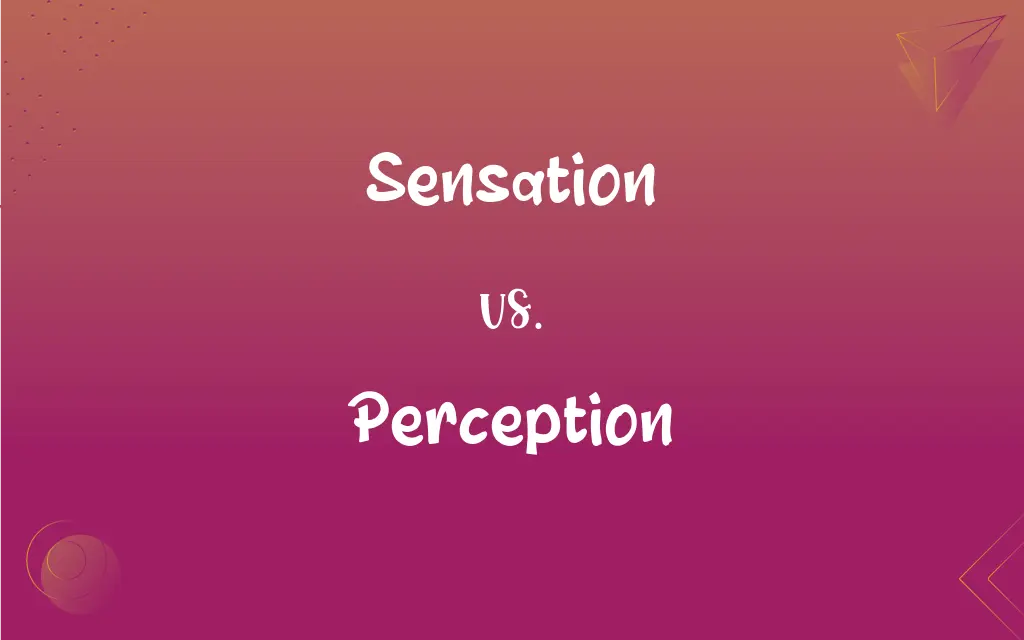Sensation vs. Perception: What's the Difference?
Edited by Aimie Carlson || By Janet White || Published on November 10, 2023
Sensation is the process of detecting stimuli through the senses, while Perception is the interpretation and understanding of those stimuli by the brain.

Key Differences
Sensation refers to the immediate process of sensing environmental stimuli via the body's sensory organs, such as the eyes, ears, nose, tongue, and skin. This process involves the conversion of external stimuli, like light or sound waves, into electrical signals that can be understood by the brain. Conversely, Perception encompasses the subsequent process where the brain interprets these signals to form meaningful information and cognitions.
While Sensation provides raw data to the brain via sensory organs, it is Perception that adds meaning and context to this data. For instance, Sensation might allow one to detect the colors and shapes in a painting, but it's Perception that lets one appreciate and understand the artwork's depth, emotion, or symbolism.
In a practical scenario, consider the Sensation of feeling something soft against the skin. The sensory receptors in the skin detect this touch and send signals to the brain. However, it's the Perception process that lets one identify the soft object as, perhaps, a feather or a silk cloth.
Both Sensation and Perception are integral parts of how humans interact with their environment. While Sensation provides the initial raw input, Perception helps to craft a meaningful narrative or understanding from that input. Together, they ensure that individuals can comprehend, navigate, and respond effectively to their surroundings.
Comparison Chart
Definition
Process of detecting external stimuli via sensory organs.
Brain's interpretation and understanding of detected stimuli.
ADVERTISEMENT
Involves
Sensory receptors and neural pathways.
Cognitive processes in the brain.
Sequence
Occurs before Perception.
Follows after Sensation.
Example
Detecting light waves through the eyes.
Recognizing the face of a friend in the light.
Nature
Provides raw, uninterpreted data.
Assigns meaning and context to sensory data.
Sensation and Perception Definitions
Sensation
Sensation translates external events into neural signals.
The sensation of the music's beat made her heart race.
ADVERTISEMENT
Perception
Perception is the cognitive interpretation of sensory input.
Her perception of the situation was different from others.
Sensation
Sensation provides initial raw inputs to the brain.
The sensation of the scent triggered distant memories.
Perception
Perception integrates sensory information to form coherent interpretations.
The optical illusion played tricks on their perception.
Sensation
Sensation is the detection of environmental stimuli.
The sensation of warmth spread through her as she stood in the sunlight.
Perception
Perception adds context and meaning to raw sensory data.
The painting's perception changed as he learned the artist's intent.
Sensation
A perception associated with stimulation of a sense organ or with a specific body condition
The sensation of heat.
A visual sensation.
Perception
Perception shapes our understanding of the environment.
His perception of danger made him avoid the dark alley.
Sensation
The faculty to feel or perceive; physical sensibility
The patient has very little sensation left in the right leg.
Perception
The process of perceiving something with the senses
The perception of a faint sound.
Sensation
An indefinite generalized body feeling
A sensation of lightness.
Perception
An instance of this
Sense perceptions.
Sensation
A state of heightened interest or emotion
"The anticipation produced in me a sensation somewhat between bliss and fear" (James Weldon Johnson).
Perception
The process or state of being aware of something
The perception of time.
Sensation
A state of intense public interest and excitement
"The purser made a sensation as sailors like to do, by predicting a storm" (Evelyn Waugh).
Perception
Insight or knowledge gained by thinking
The perception that inheritance must be coded in DNA.
Sensation
A cause of such interest and excitement
The band's new singer is a sensation.
Perception
The capacity for such insight or knowledge
Theories of how to enhance human perception.
Sensation
A physical feeling or perception from something that comes into contact with the body; something sensed.
Perception
An insight or point of knowledge
The article is full of astute perceptions.
Sensation
A widespread reaction of interest or excitement.
Perception
An interpretation or impression; an opinion or belief
Doctors working to change the public perception of certain diseases.
Sensation
A small serving of gin or sherry.
Perception
The organisation, identification and interpretation of sensory information.
Sensation
An impression, or the consciousness of an impression, made upon the central nervous organ, through the medium of a sensory or afferent nerve or one of the organs of sense; a feeling, or state of consciousness, whether agreeable or disagreeable, produced either by an external object (stimulus), or by some change in the internal state of the body.
Perception is only a special kind of knowledge, and sensation a special kind of feeling. . . . Knowledge and feeling, perception and sensation, though always coexistent, are always in the inverse ratio of each other.
Perception
Conscious understanding of something.
Have perception of time
Sensation
A purely spiritual or psychical affection; agreeable or disagreeable feelings occasioned by objects that are not corporeal or material.
Perception
Vision (ability)
Sensation
A state of excited interest or feeling, or that which causes it.
The sensation caused by the appearance of that work is still remembered by many.
Perception
Acuity
Sensation
An unelaborated elementary awareness of stimulation;
A sensation of touch
Perception
(cognition) That which is detected by the five senses; not necessarily understood (imagine looking through fog, trying to understand if you see a small dog or a cat); also that which is detected within consciousness as a thought, intuition, deduction, etc.
Sensation
Someone who is dazzlingly skilled in any field
Perception
The act of perceiving; cognizance by the senses or intellect; apperhension by the bodily organs, or by the mind, of what is presented to them; discernment; apperhension; cognition.
Sensation
A general feeling of excitement and heightened interest;
Anticipation produced in me a sensation somewhere between hope and fear
Perception
The faculty of perceiving; the faculty, or peculiar part, of man's constitution by which he has knowledge through the medium or instrumentality of the bodily organs; the act of apperhending material objects or qualities through the senses; - distinguished from conception.
Matter hath no life nor perception, and is not conscious of its own existence.
Sensation
A state of widespread public excitement and interest;
The news caused a sensation
Perception
The quality, state, or capability, of being affected by something external; sensation; sensibility.
This experiment discovereth perception in plants.
Sensation
The faculty through which the external world is apprehended;
In the dark he had to depend on touch and on his senses of smell and hearing
Perception
An idea; a notion.
Sensation
Sensation involves the immediate response to external factors.
The sensation of the cold breeze made him shiver.
Perception
The representation of what is perceived; basic component in the formation of a concept
Sensation
Sensation is the body's primary interaction with the outside world.
The sensation of sand between his toes reminded him of the beach.
Perception
A way of conceiving something;
Luther had a new perception of the Bible
Perception
The process of perceiving
Perception
Knowledge gained by perceiving;
A man admired for the depth of his perception
Perception
Becoming aware of something via the senses
Perception
Perception involves higher brain functions and cognition.
The magician's trick altered the audience's perception of reality.
FAQs
Are all Sensations perceived the same way by everyone?
No, Perception can vary based on individual experiences, context, and cognition.
How does Sensation contribute to our daily life?
Sensation provides the initial input, like touch or sound, that helps us interact with the environment.
Can Perception occur without Sensation?
No, Perception requires sensory data from Sensation to form interpretations.
How does the brain process Sensation?
Sensory organs send signals via neurons to the brain for processing.
Can Perception be influenced by emotions or past experiences?
Yes, past experiences and emotions can significantly shape our Perception of stimuli.
Which comes first, Sensation or Perception?
Sensation comes first, providing raw data that Perception then interprets.
How are Sensation and Perception studied?
Through disciplines like psychology, neuroscience, and cognitive science.
Why might two people perceive the same Sensation differently?
Differences in background, experiences, and cognitive processes can lead to varied Perceptions.
Is Sensation a conscious process?
Not always; some sensations can be subliminal, not consciously detected.
What's the primary distinction between Sensation and Perception?
Sensation detects stimuli, while Perception interprets and understands them.
Are Sensation and Perception only about vision?
No, they encompass all senses, including hearing, touch, taste, and smell.
Is Perception always accurate?
Not always; factors like illusions, biases, or expectations can alter Perception.
How do sensory impairments affect Sensation and Perception?
They can limit or alter the sensory data received and subsequently how it's perceived.
How do expectations shape Perception?
Expectations can prime the brain to perceive in line with preconceived notions.
Can technology enhance human Sensation?
Yes, devices like hearing aids or night vision goggles can augment sensory capabilities.
Can Perception be trained or honed?
Yes, through practices like mindfulness or specific training, like in arts or sports.
Does culture influence Sensation and Perception?
While Sensation is generally constant, cultural contexts can shape Perception.
Are there limits to human Sensation?
Yes, like the range of audible sounds or visible light wavelengths.
Why do optical illusions trick our Perception?
They exploit the brain's perceptual rules, causing misinterpretations.
Why is understanding the difference between Sensation and Perception important?
It helps appreciate the complexities of human cognition and interaction with the environment.
About Author
Written by
Janet WhiteJanet White has been an esteemed writer and blogger for Difference Wiki. Holding a Master's degree in Science and Medical Journalism from the prestigious Boston University, she has consistently demonstrated her expertise and passion for her field. When she's not immersed in her work, Janet relishes her time exercising, delving into a good book, and cherishing moments with friends and family.
Edited by
Aimie CarlsonAimie Carlson, holding a master's degree in English literature, is a fervent English language enthusiast. She lends her writing talents to Difference Wiki, a prominent website that specializes in comparisons, offering readers insightful analyses that both captivate and inform.







































































